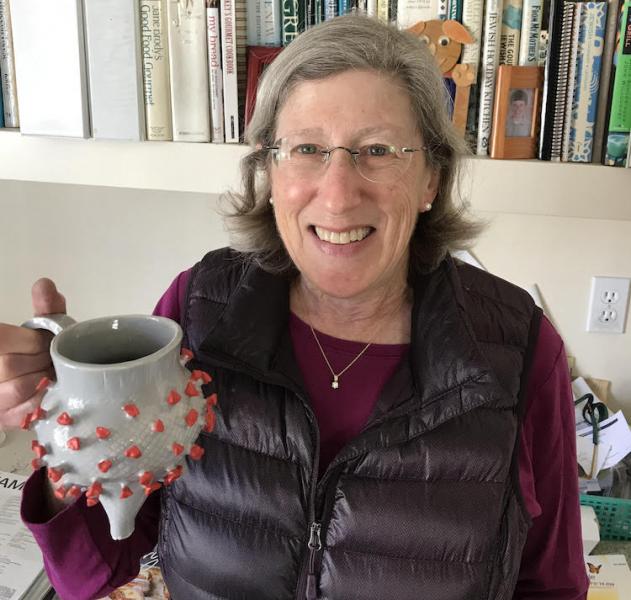
Deborah Gold, M.D. practiced in the field of infectious disease for 31 years in a teaching hospital and treated diseases including tuberculosis, HIV/AIDS, malaria, and infections involving bones and heart valves. She has given more than thirty medical center grand rounds on topics such as Zika, Ebola, SARS, pandemic influenza, and penicillin allergy. Dr. Gold is teaching Infectious Diseases in the News with us this spring.
I popped into your class today and the first thing I saw was a photo of a hand with withered, blackened fingers. It was quite the intro.
Well, you know, it wasn’t called the Black Death for nothing.
What made you want to specialize in infectious diseases?
I think it started with Nancy Drew. I began reading the books in maybe third grade and got hooked on mysteries and collecting clues and trying to figure out the answer. Studying infectious diseases often involves a lot of sleuthing and asking about everything to try to get to the bottom of things. Say somebody comes in with a fever of unknown origin. You have to ask everything: Where have you been? What did you eat? Did you drink the water? Swim? Hike? Camp? Was there a moose, a squirrel, a rusty can? Have you had dental work recently? Are you eating unpasteurized dairy products? You have to ask so many things — some of which can sound off the wall — and then try to separate the wheat from the chaff to figure out what's going on. It’s kind of like being a detective.
Sounds like you have to be both wildly curious and comfortable with unknowns.
Absolutely. Sometimes you hit a brick wall and have to start over. Plus the work involves a lot of listening, a lot of “please tell me the story over again. I read the chart. I just want to hear it from you.” Sometimes the infectious disease person is the person who gets called in when the medical team can't figure out what's going on with a patient.
When did you first learn about COVID?
It was when the first cases were reported out of China in the first few days of January, 2020. When I first heard the reports, I was, like, well, I’ve been around a long time. This isn’t my first rodeo. I know what’s coming. I’ve been through SARS in 2002, swine flu in 2009 and others. But when I saw the photos of construction sites in China, where they were building a hospital in a week that could accommodate 1,000 patients? That told me everything I needed to know. It confirmed for me that there was human-to-human transmission and that it was likely people could transmit infection even if they had no symptoms.
How did you get involved with the MAVEN Project? I believe you gave close to 100-weekly briefings on COVID to medical providers who volunteer in underserved communities.
I started volunteering with MAVEN when I retired in 2018. Then COVID hit, and I was asked if I’d be willing to give a talk about what we, at the time, called “novel coronavirus.” I said yes, of course. And that was the start of it. I then spent about 16-hours a week for two years preparing for these talks — diving into the latest research and then making it interesting and understandable by different kinds of medical providers who were struggling to keep current. My final presentation was last Wednesday. My other final presentation was August, 2021 — and then I had to start up again when Delta arrived. I will restart my COVID updates if things take a turn for the worst.
What advice would you give people who’ve been vaccinated, boosted, and have generally been cautious? What should they do now?
I would say don't let your guard down. We let our guard down before and bad things happened and bad things could still happen. So, I think people need to be vigilant. They need to watch the numbers. I still wear an N95 mask when I go into the grocery store and I think that forevermore I'm going to wear a mask on an airplane. You just have to figure out what your tolerance is for risk. Most people don’t think about long COVID, which I believe is going to be a huge burden on the health care system. People with long COVID are quite impaired, their lives have been dramatically changed, and I don't want to get anywhere near that. I want to enjoy my retirement. The best way to avoid getting long COVID is to not get infected in the first place.
Finally, Debbie, I have to ask: What do you have against romaine lettuce? I’ve seen you toss a head of lettuce into a garbage can, which was very dramatic. Do you just not like Caesar salad?
I used to eat romaine lettuce all the time, but I haven’t for maybe 10 years. When you look at what foods are most frequently recalled because they are responsible for outbreaks of infection, it’s often lettuce and almost always romaine. Lettuce can easily get contaminated with bacteria that can make you really sick, put you in the hospital or even kill you. And the older you are, the more vulnerable you are to succumbing to these kinds of infections. I should mention that I have not eaten Caesar salad for almost 40 years because of the raw eggs in the dressing. The romaine just increases the risk of illness.